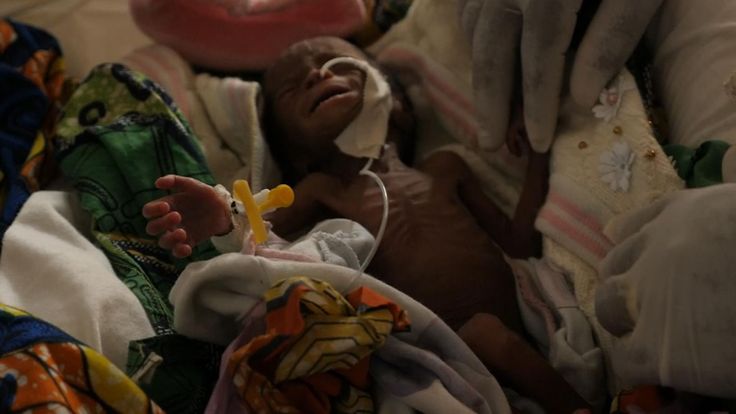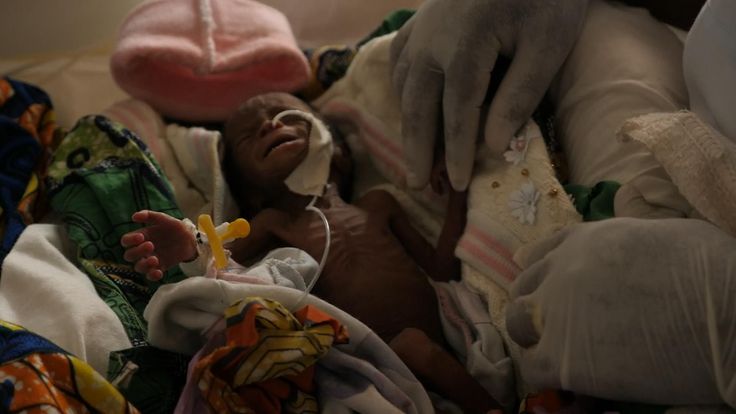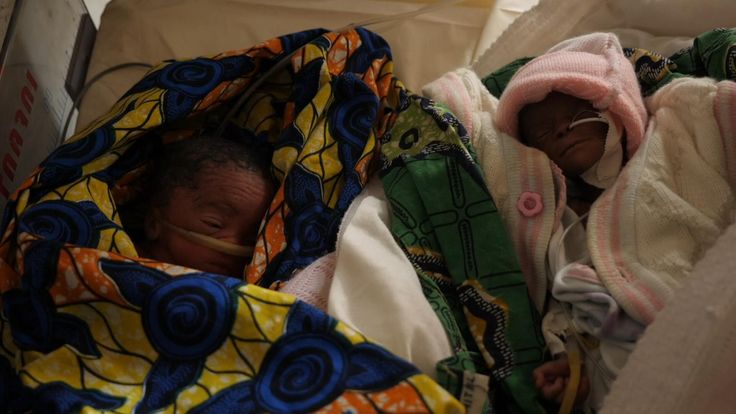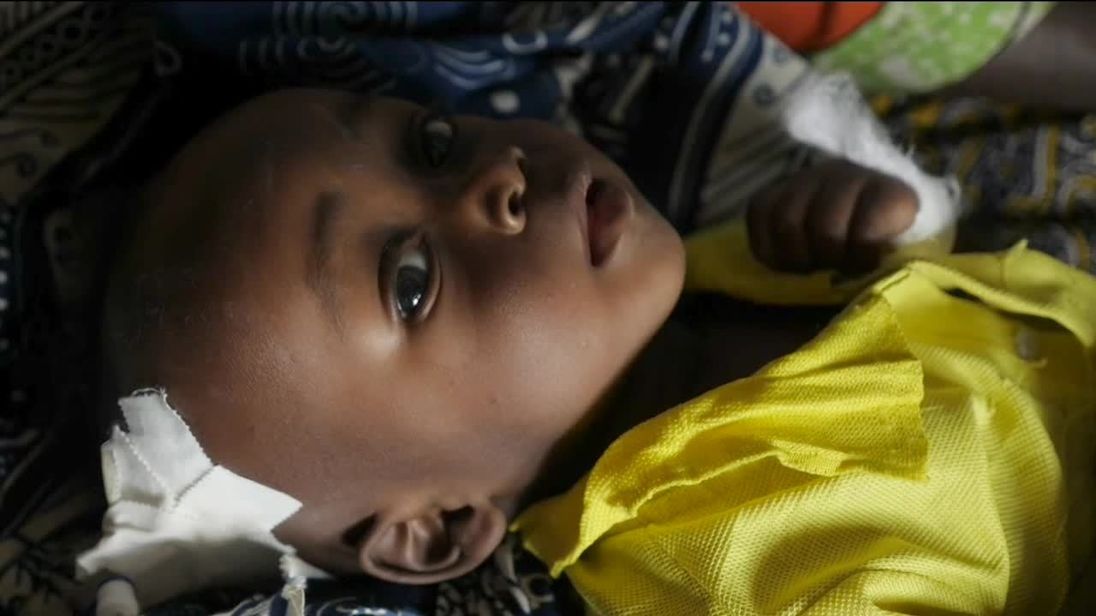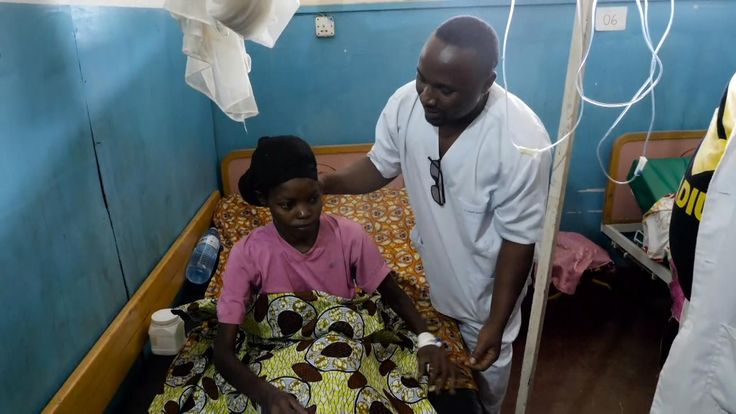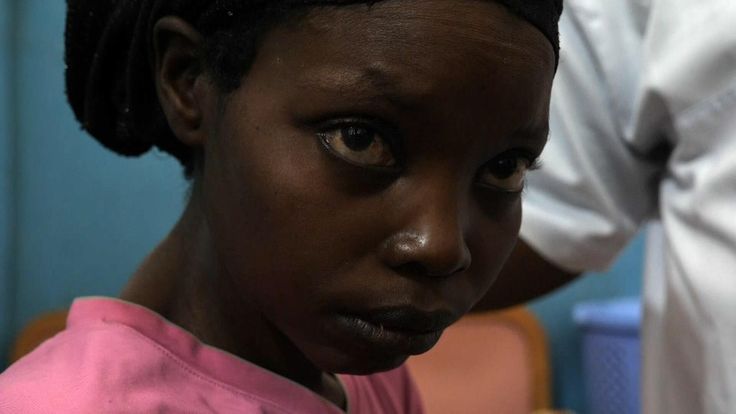Alex Crawford, Special Correspondent
As pressure from the international community grows on Democratic Republic of Congo’s Joseph Kabila to hold elections, a deepening humanitarian crisis and unrest grips the country.
Warning: Some readers may find photos below distressing.
A baby with nothing, not even a name lies in a hospital cot in DRC’s central hospital in Bunia, fighting to live. His tiny skeletal chest heaves up and down as he battles for every breath with under-developed lungs.
His translucent hands are about the same size as the thumb of the doctor examining him. He has no clothes, no home, not even the cot to himself. He’s sharing it with the hospital’s latest arrival – another baby born earlier in the day, who looks equally fragile.
The two of them hover between life and death. It’s too early to say which will be their fate. But should it be life, their futures look decidedly bleak in this, one of the world’s richest countries in terms of natural resources.
The babies are two of the Democratic Republic of Congo’s “internally displaced”, basically a fancy name for refugees in their own country.
There are 4.5 million others according to the United Nations, making them the largest number of internally displaced people in the whole of Africa. They’re people who’ve fled violence, left their homes and run trying to find safety anywhere.
Many are severely under-nourished. Some 7.7 million people are classified as severely hungry. They’re all desperately poor, prone to sickness and now living in the direst of conditions in huge squalid camps with little sanitation and where disease festers.
The statistics are shocking. Some 13.1 million Congolese need humanitarian aid. That’s the same number as in Syria.
Looking at the little baby with no name battling for every gulp of air, struggling to hang on to this thread of a chance he’s been given, I thought of what lay ahead for him, should he win this, the first of a lifetime of challenges.
The dismal numbers scream out his life will be fraught with problems. Firstly, his 26-year-old mother, Lutove has to survive herself. She is also in the central hospital – but laying in a male ward because of lack of beds, weak through hunger and now ill with tuberculosis.
When we saw her, she couldn’t haul herself upright and couldn’t walk, she was that weak. The doctor measured her upper arms using a tape meant for babies from three months to three years.
She gave birth three weeks ago after running away from machete-wielding men who attacked her village for the second time. She was 28 weeks pregnant at the time.
The stress and panic triggered the birth of her baby some 14 weeks early. With little food throughout her pregnancy, she was under-weight and under-nourished and her baby son was born weighing less than half a bag of sugar.
Three weeks of hospital care had helped but when we saw him, he was still only 750 grammes with ribs which stuck out so you could count each and every one of them.
The central hospital paediatric wing is filled and overflowing into tents outside with mothers and babies lining the pavement and corridors.
Inside, there are frequently two babies to a bed. All of them are the children of the “internally displaced” – hungry, vulnerable to disease which is easily spread in the poor living conditions they now find themselves.
It is a miserable lot – and many believe this is man-made tragedy – caused by decades of ethnic conflict, multiple militias controlling and fighting for territory, rampant corruption and a president whose term expired last year but who’s still clinging to power whilst most of his country cling to life.
DRC should be one of Africa’s rich countries. It’s Africa’s largest copper producer and has more than half of the world’s supply of cobalt laying beneath its soil. But it ranks very low on the UN Human Development Index.
President Joseph Kabila is now under pressure from the international community to hold elections as soon as possible as parts of his country descend deeper into chaos.
The baby with no name hardly has the strength to cry – but the cries around his country are growing louder and stronger for a new leader who may give fresh hope to the world’s most complex and longest standing humanitarian crises.
From – SkyNews



